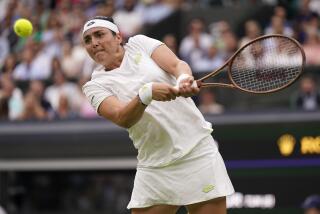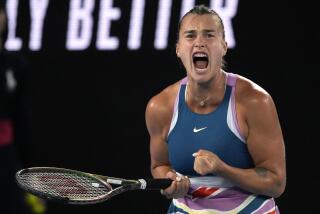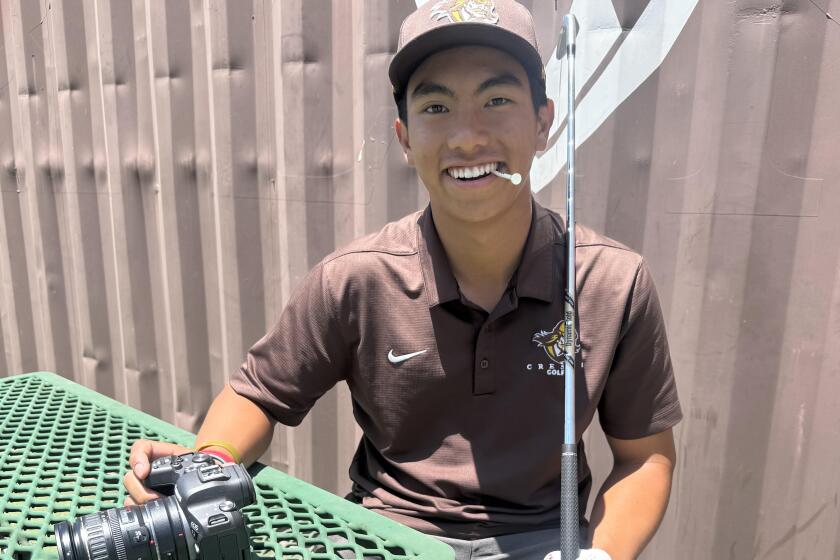Williams needs fast recovery
- Share via
MELBOURNE, AUSTRALIA — Dinara Safina had an easy-going Friday at the Australian Open. She had a light hit, she did a 2 p.m. media session in which she was relaxed and in air-conditioned comfort. It was mostly an effortless day for the 22-year-old Russian, who will play in her second-ever Grand Slam tournament final Saturday night.
Safina’s opponent, Serena Williams, 27, had a more sweaty and emotional day.
She and her sister Venus started off the competitive play at Rod Laver Arena with an energetic 6-3, 6-3 doubles win over Ai Sugiyama of Japan and Daniela Hantuchova of Slovakia.
It was the championship match, and the win gave the Williams sisters their third Australian Open title and their eighth major-tournament doubles title.
Serena has three of those Aussie Open singles titles in her possession already, nine Grand Slam singles titles overall. And her preparation for earning another hasn’t been to hang out in the shade and hide from the competition.
The arena roof was closed for the match, a heat emergency back in effect as the temperature outside reached 111 degrees in the third day of a record-setting heat wave. Still, the air was steamy and Serena expended plenty of energy on the day before her big singles final. She was grunting from the effort that appeared genuine.
She and Venus embraced after the final point, a display that earned the sisters applause. Serena hasn’t been the crowd favorite much here. The Aussies like the underdog and Serena hasn’t been that.
Also on the line Saturday night is the No. 1 computer ranking, a place Williams has been but Safina hasn’t. Williams has spent 61 weeks during her career at the top, the last time in October. If Safina wins, she would join Maria Sharapova as the only Russian women to reach that spot.
“Being No. 1 would be nice,” Williams said. “But for me the most important thing is just winning.”
Williams, who has lost two sets in the tournament, also would like a payoff for what she said was her hardest-working off-season. She said she was surprised she hasn’t been more dominant.
“I was really prepared for this,” Williams said. “I practiced more than I’ve ever practiced ever. Maybe if anything I should have practiced less and drank more . . . water.”
Safina, who also did intense off-season conditioning that resulted in a 10-pound weight loss, was asked about whether she would have an advantage in the finals because her opponent played today.
“Well,” she said, “we’re playing during the night, so I think she has enough time to recover. But, you know? I have even more time to recover.”
By reaching the finals of the doubles and singles tournaments this week, Williams became the all-time money leader on the Sony Ericsson WTA Tour, passing Lindsay Davenport’s total of $22,144,735 and also moving ahead of recently retired golfer Annika Sorenstam ($22,573,192) for career earnings among all female athletes.
Williams claims to be frugal with her money. After her quarterfinal win over Svetlana Kuznetsova when Williams lost the first set, she said she would have flown home to Florida in coach had she lost the match. “I wouldn’t have deserved to spend the money for first class,” she said.
This Australian Open will mark the first time the women’s singles final is scheduled to be a night match. It was because of the ascendancy of Venus and Serena Williams that the U.S. Open moved the women’s final to prime time in 2001 and this week Serena said she appreciated the spotlight and the fact that, roof or not, at least the sun wouldn’t be heating up her adrenaline.
“It’s been so hot here,” she said. “But I’m from Florida, I can take it.”
Williams has a 5-1 career advantage over Safina, whose brother Marat Safin won the Australian Open in 2005 (he also won the 2000 U.S. Open).
Safina said she didn’t have any specific game plan against Williams. “There is no game like this. You just think what you have to do and that’s all.”
--
More to Read
Go beyond the scoreboard
Get the latest on L.A.'s teams in the daily Sports Report newsletter.
You may occasionally receive promotional content from the Los Angeles Times.










